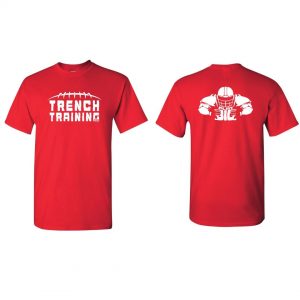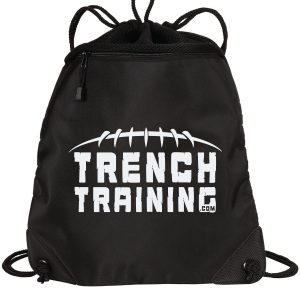
by Steve Stark | Oct 25, 2016 | coaching kids, youth football
Are there specific offensive line skills our kids should be learning?
Of course there are!
So why do coaches not spend the time to teach offensive line skills?
We have quarterbacks, running backs and receivers doing ball drills all year long.
The traditional “skill” players are now very heavily involved in 7 on 7 leagues and there are tons of camps designed for these positions.
What do we have the linemen do?
Lift.
While getting bigger and stronger is certainly important, there are actual position specific skills to focus on as well.
Linemen make up nearly half of the offensive team on the field.
Include a tight end, who should have these skills, and it’s more than half.
Yet we often spend the least amount of time developing offensive line skills.
We hit sleds, we hit each other, but we don’t work enough technique.
What are some of the skills offensive linemen can be working on?
4 Critical Offensive Line Skills
1. Stance
Is stance really a skill?
It is. And it’s quite possibly the most important skill for young linemen to learn.
Offensive line is the most unnatural position in sports.
Throwing, catching, kicking and running all involve very natural movements.
Getting into a stance is unnatural and takes a lot of time and repetition.
An offensive lineman’s stance is the foundation of their game.
Without a great stance, players are limited in their ability to make great plays.
2. Footwork
Speed is not a necessity in the offensive line.
However, agility is.
Once players perfect their stance they then need to be able to get out of that stance and attack.
Having fast feet will allow them to get into the proper position to make a block.
Keeping their foot in the ground is also important to maintain strength, leverage and balance.
All or which are needed to be a good offensive lineman.
3. Punch
Up front, football is about striking and maintaining blocks.
A player’s speed and strength with their punch helps them to create leverage.
Keeping tight hands is critical to having an effective and powerful punch.
Tight hands also keep referees’ flags in their pockets. (Because we NEVER hold… 😉 )
4. Pass Sets
We have a lot of coaches and players tell us they don’t really need to ever pass set.
Really?
If you want to have any chance to play at any college level then learn to pass set.
The technique will help your balance and lateral movement.
So even if you are in an offense that never uses a pass set, there is still a benefit to learning the techniques.
These are all skills that players can work on year round.
They may not be flashy but if a young player makes the time to put in the work it will pay off.
If you you found value with today’s post please like, comment and share.
Play Big!

Coach Steve

by Steve Stark | Oct 18, 2016 | player development, training
Hip flexibility is the number one thing we at Trench Training hear about from college coaches.
How are their hips?
Do they play with their pads out?
Can they change direction?
These are some of the most common questions college coaches are asking when they watch video of recruits.
Size, strength and power all factor in to be an elite football player.
But hip flexibility is one of the key components coaches look for.
So why is hip flexibility important?
3 Benefits of Good Hip Flexibility
1. Injury prevention.
A lack of flexibility in the hips can have an impact on lower back health.
This is especially prevalent in the weight room.
Without the proper range of motion, an athlete’s form is compromised and the risk of injury increases.
We need our athletes to stay healthy and flexibility is a key component to preventing injury.
2. Improved agility and balance.
You might think agility is not a word often used with linemen.
Maybe defensive linemen but not offensive linemen, right?
Wrong.
Speed may not be a prerequisite to play in the line but agility is.
Lateral movement and quickness are a huge part of being an elite linemen.
Footwork and body position are essential for both blocking and defeating a block.
Agility and balance are also how linemen create leverage and gives them the ability to “play low”.
Playing low allows us to utilize the strength in our legs and glutes giving us a powerful base.
3. Increased explosiveness.
You have probably heard the saying, “low man wins”.
Again, playing low is going to give us a the ability to coil and become explosive off the line.
If a player is more explosive off the ball then their opponent they will have a distinct advantage.
Utilizing leverage and explosiveness, a player can compete with opponents that are bigger and stronger they are.
Hip flexibility is essential to gaining explosiveness.
What is the hip hinge?
Here’s the best definition I’ve found for the hip hinge and it’s from BreakingMuscle.com.
“A hip hinge is movement (flexion and extension) through the hip joint, keeping a neutral spine and the knees slightly flexed.”
A great way to test the hip hinge is to do the dowel hip hinge test.

Hip Hinge Dowel Test from Aaron Swanson via Youtube
In the image above, on the left you can see what it means to keep a neutral spine.
This is opposed by lumbar flexion on the right which is what you get when your hips are too tight.
Many players lack sufficient flexibility in hip flexors and adductors.
Improving this hip flexibility lays the foundation for improved athleticism and is the key to reaching elite levels.
If you you found value with today’s post please like, comment and share.
Play Big!

Coach Steve

by Steve Stark | Oct 10, 2016 | coaching kids, player development
Teaching kids leadership is often a topic we don’t spend enough time on as parents and coaches.
The ability to lead is a skill that found in almost every successful athlete.
There are many ways to be a leader.
Some leaders are quiet, some are loud and others lead without a sound.
In any case there are things we can do as parents and coaches that will help with teaching kids leadership.
5 Ways of Teaching Kids Leadership
1. Develop problem-solving skills.
Adversity happens to us all.
How we deal with adversity often determines our level of success.
We need to teach our kids that problems are a normal part of life but there are always solutions.
When faced with problems, kids need to keep calm, assess the problem, and create a plan to find a solution.
These are things we can practice at home with homework, chores, and even at play.
I remember when I was a kid we used to play wiffleball for hours.
The problem we often had was a broken or lost wiffleball.
So we came up with a new game. We used paper towel, scrunched it up and covered it with electrical tape.
We then used a tennis racket for a bat and voila! Tape ball was born.
Great game for a bunch of 8 year olds. (and the ball sent a mile off the tennis racket which caused us other problems. Like finding a bigger field without windows.)
2. Teach decision-making skills.
Good leaders make good decisions.
Great leaders make the same decisions faster and under pressure.
 The decisions we make define our lives.
The decisions we make define our lives.
It’s no different on a field in a game.
We can easily help teach this in our homes.
How many decisions do you make for your children that they could be making themselves on a daily basis?
What to wear?
What to eat?
How to spend their money?
These are very basic decisions but your kids need to take ownership of them.
There are consequences, both good and bad, for the decisions we make.
Don’t shield your child by making all their decisions for them. Let them learn through making decisions.
Even if some are wrong.
Both problem-solving and decision-making are critical to developing self-esteem and self-confidence.
These are skills that will serve them every day of their lives in any environment.
3. Emphasize the importance of communication.
Leaders have to be good communicators.
This doesn’t mean that a leader has to be vocal in a rah-rah kind of way.
It means they have to able to talk to coaches and teammates.
They need to be able to lift up their teammates when needed.
Leaders have to communicate with coaches to help coaches understand the mood and pulse of the team.
They need to be an example to others and show how to interact properly on a team.
We can help our athletes by encouraging them to talk to us about their day.
Start a discussion at home.
To many times, as parents, we just react to things instead of starting a meaningful conversation.
Be a good listener and your child will learn that aspect of communication as well.
4. Encourage more team activities.
Every opportunity to compete on a team is a chance to hone your skills as a teammate and a leader.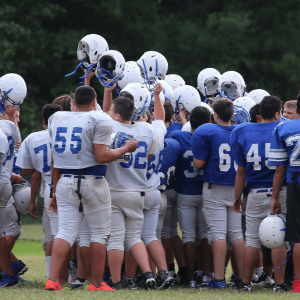
Learning to compete, lead and succeed in a team environment is invaluable.
These are lessons that will carry forward into their classroom, their home and someday their career.
There are a ton of opportunities for team activities in sports and out.
Clubs at school, church or in the community all offer the chance to participate in team activities.
Help you child take advantage of as many of these opportunities as possible.
5. Practice positivity.
Belief in yourself is the first ingredient to leadership.
A belief in your team comes in a close second.
Staying positive, even in the face of adversity, will define you as a leader.
If you hang your head as a leader, what do you think your teammates will do?
You have to stay positive and you have to believe it.
Someone is always watching so you have to be genuine with your positivity.
Just the rah-rah stuff won’t get it done.
To be a great leader your positivity has to be felt not just heard.
As parents and coaches we can teach this by being the example.
Practice positivity at home and it becomes a pillar of teaching kids leadership.
If you you found value with today’s post please like, comment and share.
Play Big!

Coach Steve
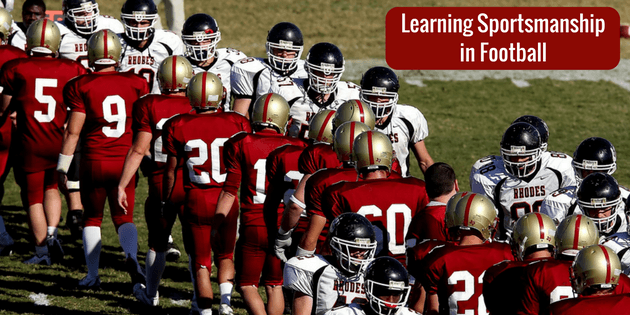
by Steve Stark | Oct 3, 2016 | coaching kids, player development
Sportsmanship in football is all about respect.
Players have to have respect for their teammates, coaches, officials, and opponents.
As we have said many times, football is a very emotional sport.
It can be difficult for players to keep their composure and make good decisions.
This past weekend I watched #3 Louisville vs. #5 Clemson.
It was a great game.
There was one play however that really disturbed me.
Clemson linebacker Ben Boulware tackled Louisville quarterback Lamar Jackson.
Boulware, after Jackson is down and in the pile, has Jackson around the neck and continues to crank hard on his neck.
Check out the video below and comment about what you see.
[video_player type=”embed” width=”560″ height=”315″ align=”center” margin_top=”0″ margin_bottom=”20″] [/video_player]
[/video_player]
It was dirty and there is no place in football for this kind of play.
In today’s video I discuss a few ways coaches and parents can help build sportsmanship in football.
[video_player type=”embed” width=”560″ height=”315″ align=”center” margin_top=”0″ margin_bottom=”20″] [/video_player]
[/video_player]
[hyperlink style=”1″ href=”http%3A%2F%2Ftrenchtraining.com%2Ffree” font_size=”20″ font_style=”bold” font_color=”%23d11515″ align=”center”]Click Here to Become a BIG PLAYER with our FREE TrenchTraining.com Membership![/hyperlink]
Building Sportsmanship in Football
Give constant reminders of what is acceptable behavior.
As parents, we do this at home all the time.
What’s amazing to me is how some parents forget this when their kids play sports.
“It’s just part of the game.” “It was in the heat of the moment.” “He’s just being aggressive.”
Really?
It’s not difficult to see right from wrong on a field or a court.
I actually know parents who take joy in seeing their kids be bullies on the field.
It’s not hard to see where these kids get this behavior.
Coaches and parents need to make behavior the highest priority in youth football.
This behavior carries over.
Kids who act poorly on the field often do so in the classroom and other social interactions.
Respect is a lesson we can teach every day in football.
It will carry over to every part of an athlete’s life.
Be a positive example of sportsmanship.
Kids learn from the adults in their lives.
Parents, coaches and other mentors influence a child’s behavior more than anything else.
That includes their peers.
Our kids want approval from their parents and coaches.
They want to make us happy.
Be sure that you give them the right example of how to behave both on and off the field.
Emphasize fun over winning.
At the youth level, everything we do should be about making sure the kids are enjoying the game.
We lose too many kids that we don’t help have fun with football.
Sportsmanship plays a huge role in keeping kids playing the sport.
We need to spend time and effort teaching our kids fundamentals of the game and making it fun.
That means letting kids play.
If the same 11 kids play every game, only those 11 can improve.
It takes more than 11 players to win games.
It takes more than 22 players to win.
It takes a team and in order to keep kids around and playing we have to make it fun.
Can you be aggressive and display sportsmanship in football?
Absolutely!
You can be aggressive and still display sportsmanship in football.
When I stepped onto a football field I wanted to destroy the team I was playing against.
But I still always had respect for my opponent.
There is no better feeling as an offensive linemen than driving a defender 10 yards off the ball and planting them on their back.
There is nothing more demoralizing for your opponent than getting up after that block and helping them back to their feet.
However, this is where so many players struggle.
“Act like you’ve been there before.”
If a player makes a great play it’s okay to celebrate.
Too many young players like to posture and taunt.
There’s nothing wrong with celebrating but players can do it without showing up their opponent.
Start with respect and display good sportsmanship.
If you you found value with today’s post please like, comment and share.
Play Big!

Coach Steve
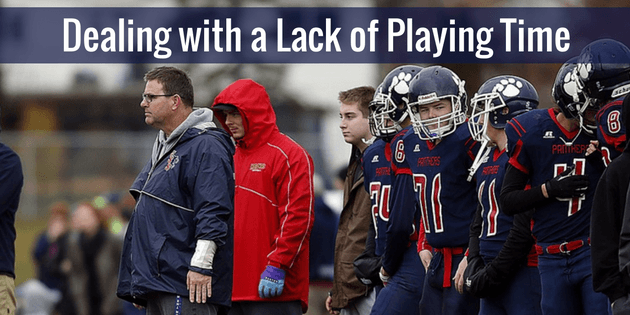
by Steve Stark | Sep 26, 2016 | coaching kids, player development
Recently, a mother of a player asked me about playing time.
Her son plays Sophomore (JV), is playing both ways, and is doing very well.
He was asked to dress for the varsity game on Friday night and he did.
The varsity team was winning by a lot and the coach put in all the players with the exception of him.
Both mom and player were frustrated that he did not get in.
So she wanted my opinion on the situation.
For me, there are a lot of things that I have learned in regards to playing time and coaches.
One of the biggest messages that I can give now that I have spent so much time learning how to coach others is that the ONLY PERSON you can control is yourself.
We as a society have gotten really good at blaming and questioning others because of social media, all the football commentary that is on tv these days and just the massive amounts of information that is out there for the general public to find.
Many feel that they know more than coaches.
Coaches have many reasons for how they decide on playing time.
One of the things that could have happened is that there were Juniors or Seniors that they had to play because they don’t have the opportunity on the Sophomore team.
This is just one reason that I came up with but there are many others.
Help your athletes learn to be grateful for the things that they have.
I am sure many other sophomores would have loved to just be able to put on a jersey and stand on the sidelines with all the fans there.
Finding an attitude of gratitude changes players very quickly and puts things in perspective.
It is incredibly tough to be a coach these days.
One reason is the amount of criticism that is placed on you by parents and players.
So with that said, I had given the advice that the best thing that a player can do when he does not reach the goal of getting the type of playing time he thinks he deserves is to place the frustration and anger on his own shoulders and use it as a chip to practice and play harder.
Again the only person that you can control is yourself.
In football, injuries, bad play, etc., happen all the time and players get replaced by others that sit in the weeds and work their ass off.
Tom Emma wrote an article that said a lot of what I agree with.
Even though it is about basketball, it holds true for all sports.
I encourage you to go to the link below and read the article. I am going to use his 8 suggestions and put my spin to each one.
But I encourage you to read his spin on it as well.
“Fortunately there are some proven strategies you can implement that will help you deal with the challenges and strong emotions that accompany not playing as much as you would like.” Excerpt from Thomas Emma http://www.coachesclipboard.net/LackPlayingTime.html
Tom had these 8 suggestions that he wrote about in the article listed above. I am responding to each with my own view point.
8 Strategies to Deal with a Lack of Playing Time
1. Ask Coach
Ask the coach what you can do better.
Don’t even mention playing or lack of playing time.
Make the focus on what it is that the coach would like you to do better and then that will give you something to really focus on in practice.
2. Keep Working
In life it is a proven fact that those that work harder are more successful than those that do not.
There are only a handful of athletes that are able to work to the highest extent of their ability.
All the rest of us have to continue to work harder.
This also includes working smarter.
The best way to work smarter is to listen to the coaches even if you disagree with them and to work towards the coaches method to the best of your ability.
Show the coach you care about what he or she has to say and work harder today than you did yesterday!
3. Always Remain Engaged and Ready Emotionally
This takes a lot of work not only on the practice field but also out of practice.
Study the plays, envision what the perfect plays look like, watch film, read material on how other athletes handle frustration, adversity and struggles of the game you play.
4. Keep it Quiet
Talk to your parents or a mentor that will keep it quiet.
The one thing that I have seen ruin morale on teams is players who complain and talk bad about others, including coaches.
The best thing you can do is to be a great teammate and support others including coaches.
Talk positively and strongly about the members on your team at all times. complaining is the biggest cancer that can happen to a team.
I know I had many complaints over the years I played.
I regret how I handled some of those instances because I can now see that it hurt my game when I was in the complaining mode.
5. Commit to Traversing the Razor’s Edge of Being a Good Teammate
I mentioned some of this above and that is to be a great teammate.
Don’t just be a good teammate, rise up to being a great teammate!
6. Always Maintain Your Passion for the Game
When you are on a losing team or you are not playing much this is a very difficult task.
This is where it is imperative to really dig deep into your core and find the passion for the love of the game.
Even on losing teams or not having playing time you can find games that you can be fully proud of the way you played and had fun.
You can also get a lot of enjoyment from practice if you turn the practice into a competition.
Finding competition is where I believe the fun comes from. Compete, compete, compete!!!
7. Help Your Direct Competition as Best You Can
Learning from and teaching others is a great asset to any team.
I get frustrated when I see a player who sulks or sits away from a team when they are either benched or they don’t get time in the game.
I have seen many players who have had that happen and they had a great attitude and helped others.
They kept their head in the game and improved their play from the sidelines in practice and as soon as the player ahead of them either gets hurt or their play decreases they come in and shine.
It is a long season.
Work hard and realize that you need to maximize every opportunity you get.
8. Take This Opportunity to Release From Self Absorption
Team sports are about the team.
Even gymnasts, swimmers and single sport athletes have a team of trainers and coaches and people supporting them.
Learning to be selfless and play for the greater good is a skill that will help you in your careers as well as your relationships that you have for the remainder of your life.
So use playing time as a chip on your shoulder to help you get more playing time as well as keep your playing time.
Football, and life for that matter, can change on a dime and you can be thrown curve balls, adversity and tragedy at any time.
Those players that learn how to handle these situations are the ones that become very successful people in life.
Use the game of football as a way to learn how to live life.
If you find yourself wanting more playing time, do yourself and your team a favor and Play Big using the techniques listed above.
Have a great day and remember to always “Play Big”

Coach Glenn











